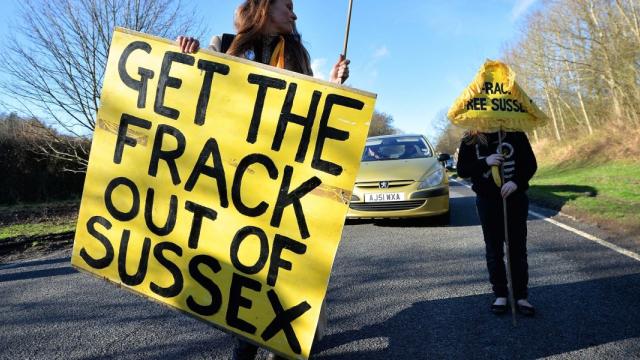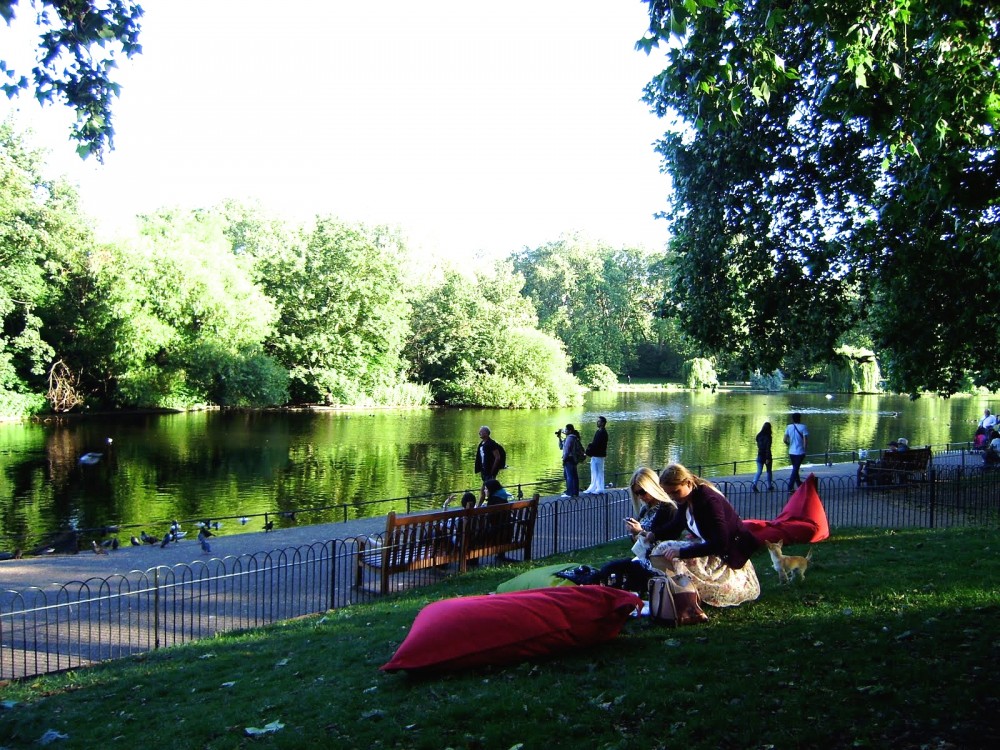
The U.K. government will allow fracking in Britain’s national parks and sites of heritage except in “exceptional circumstances,” according to new guidelines announced last week. Despite increasing public concern over the environmental impact of hydraulic fracturing, approximately half of Britain is now open to the shale gas drilling.
Bidding recently opened in the U.K. for companies looking to exploit shale gas resources. With a view to appeasing environmental groups, ministers claim they have tightened regulations on drilling in regions of the nation’s outstanding natural beauty.
The new regulations imposed by the U.K. Department of Energy and Climate Change will require companies to submit a “comprehensive and detailed” environmental report if they are looking to drill in a national park or national heritage site. The controls include a requirement to carry out a seismic survey before work begins. And Members of Parliament will have the right to reject the park fracking plans.
Proposal Met With Skepticism
Environmentalists, however, remain skeptical about the Coalition Government’s recent action. Groups such as Greenpeace maintain the government’s power to veto fracking plans will do little to “quell the disquiet of fracking opponents across Britain.”
The process of drilling into rock thousands of feet underground in order to release trapped reserves of oil and shale gas was banned in the U.K. in 2011. A ban was placed on the controversial method, known as hydraulic fracturing, following two small earthquakes that occurred in northwest England where the oil and gas company Cuadrilla Resources had been exploring for shale gas.
Despite subsequent investigations by Cuadrilla that found the cause of the tremors were “most likely” to have been caused by fracking, the government went ahead and lifted the ban. Energy Secretary Edward Davey said the decision was subject to tighter controls to “limit the risks of seismic activity.”
A British shale gas revolution?
Prime Minister David Cameron claims the new safety measures will minimize damage caused by fracking. The U.K. government also champions fracking as an answer to unemployment and soaring energy prices.
“Ultimately, done right, speeding up shale will mean more jobs and opportunities for people and help ensure long-term economic and energy security for our country,” said Matthew Hancock, the UK’s business and energy minister.
But despite U.K. minsters asserting the alleged economic benefits of fracking, many in Britain are questioning the government’s logic. AsOccupy.com covered in an earlier report, many ecological and economic arguments undermine the government’s aim to ignite a “British Shale Gas revolution.”
Lubo Jankovic, professor of Zero Carbon Design at Birmingham City University in the U.K., likens fracking to “throwing away money” because he deems it such a harmful and “temporary technology.” “Pursuing fracking is illogical, both ecologically and economically," says Jankovic, arguing that funds spent on fracking would be used more prudently financing renewables for the long-term.
The environmental group Friends of the Earth (FOE) presents scores of evidence showing why fracking won’t prove economically beneficial in Britain. In its report titled "Shale Gas: Not All It’s Fracked Up To Be," FOE highlights fracking's links to earth tremors, air pollution, climate change and water contamination – and asserts it isn’t likely to create sustainable jobs or reduce the cost of energy bills.
FOE acknowledges that in the U.S., a shale gas boom may have contributed to lower gas prices. Supporters of shale gas in the U.K. assert the same will happen in Britain. However, this assumption ignores experts' widely held view that shale gas costs are expected to be up to 50% higher in Europe than in the U.S.
"Baseless Economics"
Leading U.K. climate change economist Lord Stern has called the claim that fracking will reduce energy costs “baseless economics.” Even Energy Secretary Ed Davey admits: “We can’t expect U.K. shale production alone to have any affect [on gas prices].”
Aside from the illogical economics of it, the U.K.’s new fracking legislation in many ways replicates the lies and misinformation spun within the U.S. fracking industry. As Steve Rushton reported for Occupy.com last year, the energy action group Frack Off exposed methods that U.K. frackers are using to imitate the US fracking industry’s dishonest approach.
According to the UN Environmental Programme, even when practiced with strict controls fracking creates a number of serious health and ecological risks. In the US, the 2005 Energy Policy Act, known as the Halliburton Loophole, enabled fracking companies to be exempt from both the Safe Drinking Water Act and the Clean Water Act.
In 2012, Frack Off protested outside the U.K.’s Shale Gas Environmental Summit in London. During the summit, a senior British regulator spoke of similar strategies to give frackers exemption from safe water regulations being employed in Britain.
So the economic benefits are dubious and the corrupt loopholes mirroring the U.S. fracking industry have been exposed. So how exactly will the U.K.’s outstanding areas of natural beauty likely be affected by the new fracking rules?
A Willingness to Spoil Wild Nature
Known as "Britain’s breathing spaces," the U.K.’s national parks are part of a worldwide network of more than 100,000 protected areas. From moorlands to meadows, woods to wetlands, the areas of outstanding natural beauty are protected by an organization called the International Union for Conversation of Nature (IUCN).
The IUCN defines a protected area as: “A clearly defined geographical space, recognized, dedicated and managed through legal or other effective means, to achieve the long-term conservation of nature with associated ecosystem services and cultural values.”
In other words, the U.K.’s national parks and other protected areas have laws to protect nature and wildlife so that people can continue to enjoy the nature without destroying it. Now, with the growing body of evidence showing the negative environmental impacts of fracking, including severe risks to water and air quality and local ecosystems, many are in shock that the U.K. government is jeopardizing these allegedly protected areas.
Wide evidence suggests that the fracking process, which involves injecting millions of gallons of water mixed with chemicals underground, contaminates groundwater. A report released by the U.S. Environmental Protection Agency showed that fracking had led to contaminated water in Wyoming – though many other states, from Pennsylvania to Colorado to Texas, have reported the same. The New York Times carried out its own investigation which showed that in Pennsylvania, levels of radiation were well above federal drinking standards.
Steve Henry, a regular walker in the Peak District National Park in the north of England, says that rather than opening up parks to drilling, bans should be put in place across England.
“The government hasn’t exactly explained what the ‘extreme circumstances’ are involving fracking in national parks,” Henry told Occupy.com. “As we’ve seen in with U.S. fracking legislation, laws are there to be exploited and no doubt extreme circumstances will actually translate as lenient circumstances for many frackers.
"Placing a complete ban on fracking is the only real way to protect Britain’s protected areas,” he said.
Meanwhile, Britain's government and right-wing, business-oriented media have erroneously highlighted the new fracking legislation as a victory for environmentalists. As The Telegraph writes:
“It [fracking legislation] will be seen as a major victory for countryside campaigners, who have repeatedly called for a total ban on shale exploration in the rocks beneath national parks to protect rare wildlife and fragile habitats.”
But if this were the case, why did Sir Paul McCartney and a host of celebrities recently kick off a major campaign called We Need to Talk About Fracking? More than 150 high profile individuals around the world are calling for a freeze on shale exploration until, as they put it, a “genuinely independent, balanced and thorough public debate is held into the potential dangers the industry holds for the country.”
Without any proof that fracking delivers on energy bills – and, more importantly, without a single objective scientific study to prove the process is ecologically safe – the “exceptional circumstances” rule to drill in Britain's park lands is a clear move in the wrong direction. And most people, except the frackers and their government sponsors, appear aware of it.
3 WAYS TO SHOW YOUR SUPPORT
- Log in to post comments













